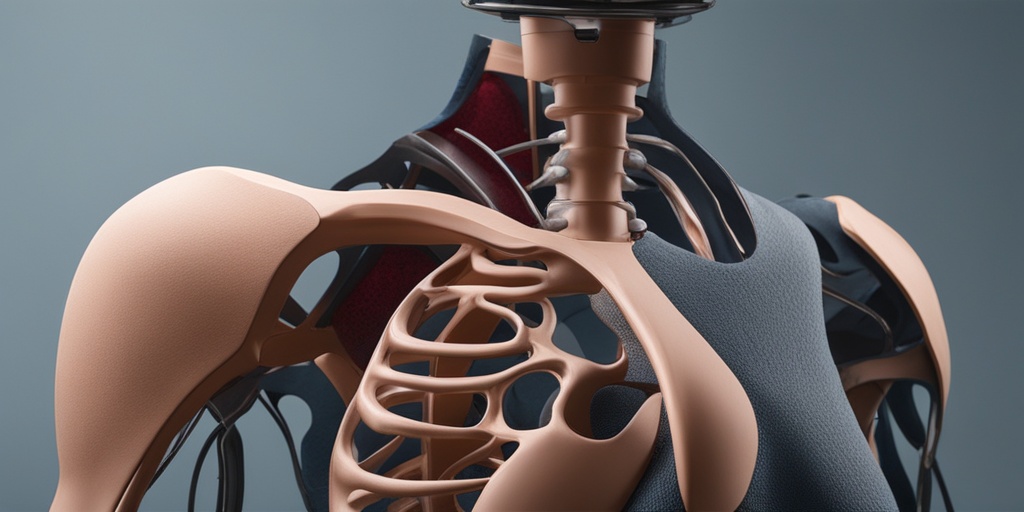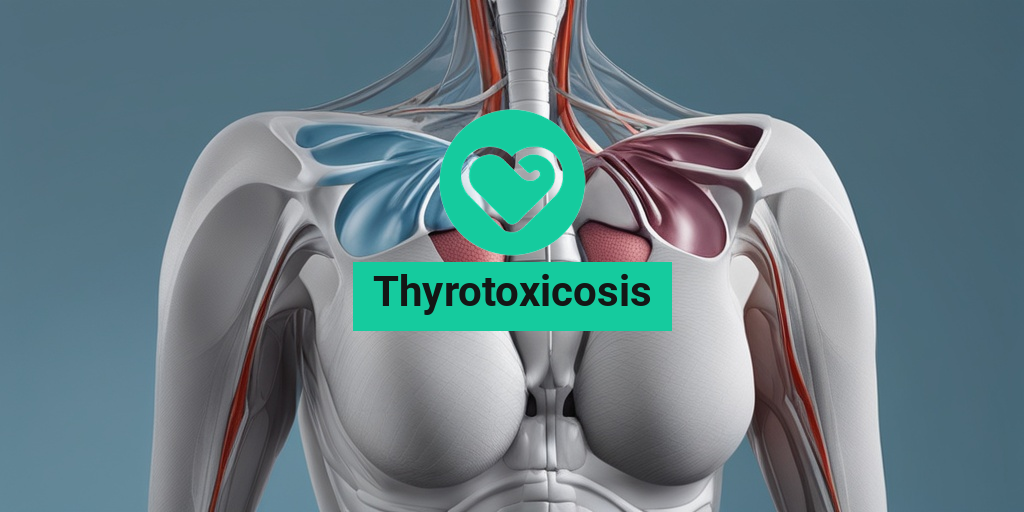What Is Thyrotoxicosis?
Thyrotoxicosis, also known as thyrotoxic crisis, is a condition where there is an excessive amount of thyroid hormones in the body. This can occur due to various reasons, including an overactive thyroid gland, thyroid nodules, or inflammation of the thyroid gland. In this article, we will delve into the world of thyrotoxicosis, exploring its symptoms, causes, and treatment options.
Understanding Thyroid Hormones
Before we dive into thyrotoxicosis, it’s essential to understand the role of thyroid hormones in our body. The thyroid gland produces two primary hormones: triiodothyronine (T3) and thyroxine (T4). These hormones play a crucial role in regulating our metabolism, growth, and development. When the thyroid gland produces excessive amounts of these hormones, it can lead to thyrotoxicosis.
Causes of Thyrotoxicosis
Thyrotoxicosis can occur due to various reasons, including:
- Graves’ disease: An autoimmune disorder that causes the thyroid gland to produce excessive amounts of thyroid hormones.
- Toxic multinodular goiter: A condition where multiple nodules in the thyroid gland produce excessive amounts of thyroid hormones.
- Toxic adenoma: A benign tumor in the thyroid gland that produces excessive amounts of thyroid hormones.
- Inflammation of the thyroid gland: Inflammation of the thyroid gland can cause the release of excessive amounts of thyroid hormones into the bloodstream.
- Overconsumption of thyroid hormone medication: Taking excessive amounts of thyroid hormone medication can lead to thyrotoxicosis.
Thyrotoxicosis Symptoms
Thyrotoxicosis symptoms can vary from person to person, but common symptoms include:
- Weight loss: Despite an increased appetite, people with thyrotoxicosis may experience weight loss due to an increased metabolism.
- Rapid heartbeat: An increased heart rate is a common symptom of thyrotoxicosis.
- Nervousness and anxiety: Excessive amounts of thyroid hormones can cause feelings of nervousness and anxiety.
- Fatigue: Despite an increased metabolism, people with thyrotoxicosis may experience fatigue and weakness.
- Heat intolerance: People with thyrotoxicosis may experience heat intolerance, leading to excessive sweating and heat strokes.
- Changes in menstrual cycle: Thyrotoxicosis can cause changes in menstrual cycles, including lighter or heavier periods.
- Enlargement of the thyroid gland: An enlarged thyroid gland, also known as a goiter, can be a symptom of thyrotoxicosis.
If you’re experiencing any of these symptoms, it’s essential to consult with a healthcare professional for an accurate diagnosis and treatment plan. Remember, thyrotoxicosis can be managed with the right treatment, and early detection is key. 🏥
Stay tuned for the next part of this article, where we’ll explore the treatment options for thyrotoxicosis and how Yesil Health AI can provide evidence-based health answers to help you navigate this condition. 💡

Thyrotoxicosis Causes and Risk Factors
Thyrotoxicosis, also known as thyrotoxic crisis, is a condition characterized by an overactive thyroid gland that produces excessive amounts of thyroid hormones. But what triggers this condition, and who is at risk? Let’s dive into the causes and risk factors of thyrotoxicosis.
Causes of Thyrotoxicosis
Thyrotoxicosis can occur due to various reasons, including:
- Graves’ disease: An autoimmune disorder that causes the thyroid gland to produce excessive amounts of thyroid hormones.
- Toxic multinodular goiter: A condition where one or more nodules in the thyroid gland become overactive, leading to excessive hormone production.
- Toxic adenoma: A benign tumor in the thyroid gland that produces excessive amounts of thyroid hormones.
- Thyroiditis: Inflammation of the thyroid gland, which can lead to the release of stored thyroid hormones into the bloodstream.
- Excessive iodine intake: Consuming large amounts of iodine can trigger thyrotoxicosis in people with underlying thyroid problems.
- Thyroid hormone medication: Taking too much thyroid hormone medication or taking it for an extended period can cause thyrotoxicosis.
Risk Factors for Thyrotoxicosis
Certain individuals are more prone to developing thyrotoxicosis due to various risk factors, including:
- Family history: Having a family history of thyroid disorders increases the risk of developing thyrotoxicosis.
- Age: Thyrotoxicosis is more common in people over 40 years old.
- Gender: Women are more likely to develop thyrotoxicosis than men.
- Pregnancy: Hormonal changes during pregnancy can trigger thyrotoxicosis in some women.
- Smoking: Smoking can increase the risk of developing thyrotoxicosis, particularly in people with Graves’ disease.
It’s essential to be aware of these causes and risk factors to take preventive measures and seek medical attention if symptoms arise. 🏥
Thyrotoxicosis Diagnosis and Testing
Diagnosing thyrotoxicosis requires a combination of physical examination, medical history, and laboratory tests. Here’s an overview of the diagnostic process:
Physical Examination and Medical History
During a physical examination, your doctor will look for signs and symptoms of thyrotoxicosis, such as:
- Rapid heartbeat
- Tremors
- Weight loss
- Enlarged thyroid gland
- Bulging eyes (in Graves’ disease)
Your doctor will also ask about your medical history, including any previous thyroid conditions, medications, and symptoms.
Laboratory Tests
Laboratory tests are essential for diagnosing thyrotoxicosis and ruling out other conditions. These tests may include:
- Thyroid function tests (TFTs): Measure the levels of thyroid hormones (T3 and T4) and thyroid-stimulating hormone (TSH) in the blood.
- Thyroid antibody tests: Detect the presence of antibodies against the thyroid gland, which can indicate Graves’ disease.
- Radioactive iodine uptake test: Measures the amount of iodine absorbed by the thyroid gland, which can help diagnose thyrotoxicosis.
- Imaging tests: Such as ultrasound, CT, or MRI scans to visualize the thyroid gland and detect any abnormalities.
A diagnosis of thyrotoxicosis is typically made based on the results of these tests, along with a physical examination and medical history. 💊

Thyrotoxicosis Treatment Options
When it comes to treating thyrotoxicosis, the goal is to reduce the symptoms and manage the condition to prevent complications. The treatment approach usually involves a combination of medications, lifestyle changes, and in some cases, surgery. Let’s dive into the various treatment options available for thyrotoxicosis.
Medications for Thyrotoxicosis
Medications play a crucial role in managing thyrotoxicosis. The type of medication prescribed depends on the severity of the condition, the underlying cause, and the individual’s overall health. Here are some common medications used to treat thyrotoxicosis:
- Thionamides: These medications, such as methimazole and propylthiouracil, work by reducing the production of thyroid hormones. They are often used as a first-line treatment for thyrotoxicosis.
- Beta blockers: These medications, such as propranolol, help alleviate symptoms like tremors, anxiety, and rapid heartbeat by blocking the effects of excessive thyroid hormones.
- Corticosteroids: In some cases, corticosteroids like prednisone may be prescribed to reduce inflammation and swelling in the thyroid gland.
- Radioactive iodine: This medication is used to destroy part of the thyroid gland, reducing the production of thyroid hormones. It’s often used for patients with Graves’ disease, a common cause of thyrotoxicosis.
In addition to medications, lifestyle changes can also help manage thyrotoxicosis. These may include:
- Dietary changes: Eating a balanced diet that’s low in iodine and avoiding foods that can trigger thyroid hormone production, such as seaweed and dairy products.
- Stress management: Practicing stress-reducing techniques like yoga, meditation, and deep breathing exercises to help manage anxiety and stress.
- Regular exercise: Engaging in regular physical activity to help reduce stress and anxiety.
In some cases, surgery may be necessary to remove part or all of the thyroid gland. This is usually recommended for patients who:
- Have a large goiter (enlarged thyroid gland) that’s compressing the trachea or esophagus.
- Have thyroid cancer.
- Experience severe symptoms that don’t respond to medications.
It’s essential to work closely with a healthcare provider to determine the best treatment approach for thyrotoxicosis. With the right combination of medications, lifestyle changes, and in some cases, surgery, it’s possible to manage the condition and improve overall health. 💊

Surgery for Thyrotoxicosis
When it comes to treating thyrotoxicosis, surgery is often considered a last resort, but in some cases, it may be the most effective option. If you’re considering surgery for thyrotoxicosis, it’s essential to understand the different types of surgical procedures, their benefits, and potential risks.
Types of Surgery for Thyrotoxicosis
There are two primary types of surgery for thyrotoxicosis: thyroidectomy and radioiodine ablation.
Thyroidectomy
A thyroidectomy is a surgical procedure that involves removing part or all of the thyroid gland. This surgery is usually recommended for patients with large goiters, thyroid nodules, or thyroid cancer. There are two types of thyroidectomy:
- Partial thyroidectomy: This involves removing only the affected part of the thyroid gland, leaving the rest intact.
- Total thyroidectomy: This involves removing the entire thyroid gland.
The benefits of thyroidectomy include:
- Quick relief from symptoms: Surgery can provide rapid relief from thyrotoxicosis symptoms, such as tremors, anxiety, and weight loss.
- Reduced risk of complications: Removing the thyroid gland can reduce the risk of complications, such as thyroid storm, which can be life-threatening.
Radioiodine Ablation
Radioiodine ablation is a non-surgical procedure that involves taking a radioactive iodine pill to destroy part of the thyroid gland. This treatment is usually recommended for patients with Graves’ disease or toxic multinodular goiter.
The benefits of radioiodine ablation include:
- Less invasive: Radioiodine ablation is a non-surgical procedure, which means it’s less invasive and carries fewer risks compared to surgery.
- Outpatient procedure: Radioiodine ablation is typically an outpatient procedure, which means you can go home the same day.
Thyrotoxicosis Complications and Prevention
Thyrotoxicosis can lead to several complications if left untreated or poorly managed. It’s essential to be aware of these potential complications and take steps to prevent them.
Complications of Thyrotoxicosis
Some common complications of thyrotoxicosis include:
- Thyroid storm: A life-threatening condition that occurs when thyrotoxicosis is left untreated or poorly managed. Symptoms include fever, rapid heart rate, and even heart failure.
- Osteoporosis: Thyrotoxicosis can lead to bone loss and osteoporosis, particularly in older adults.
- Heart problems: Thyrotoxicosis can increase the risk of heart problems, such as atrial fibrillation, heart failure, and even heart attack.
Preventing Thyrotoxicosis Complications
To prevent thyrotoxicosis complications, it’s essential to:
- Get regular check-ups: Regular health check-ups can help identify thyrotoxicosis early, reducing the risk of complications.
- Take medication as prescribed: Adhere to your medication regimen to manage thyrotoxicosis symptoms and prevent complications.
- Maintain a healthy lifestyle: Eat a balanced diet, exercise regularly, and manage stress to reduce the risk of thyrotoxicosis complications.
By understanding the different surgical options and taking steps to prevent complications, you can effectively manage thyrotoxicosis and reduce the risk of serious health problems. 💊

Frequently Asked Questions about Thyrotoxicosis
What is Thyrotoxicosis?
Thyrotoxicosis is a condition where the thyroid gland produces excessive amounts of thyroid hormones, leading to an overactive thyroid. This can cause a range of symptoms, including weight loss, rapid heartbeat, and anxiety.
What are the Causes of Thyrotoxicosis?
Thyrotoxicosis can be caused by various factors, including Graves’ disease, thyroid nodules, and excessive intake of thyroid hormones. In rare cases, it can also be caused by thyroiditis, a condition where the thyroid gland becomes inflamed.
What are the Symptoms of Thyrotoxicosis?
The symptoms of thyrotoxicosis can vary from person to person, but common symptoms include:
- Weight loss
- Rapid heartbeat
- Anxiety
- Fatigue
- Heat intolerance
- Tremors
- Changes in menstrual cycle
How is Thyrotoxicosis Diagnosed?
Thyrotoxicosis is typically diagnosed through a combination of physical examination, medical history, and laboratory tests, including:
- Thyroid function tests (TFTs)
- Thyroid-stimulating hormone (TSH) test
- Free thyroxine (FT4) test
- Free triiodothyronine (FT3) test
What is the Treatment for Thyrotoxicosis?
The treatment for thyrotoxicosis depends on the underlying cause and severity of the condition. Common treatments include:
- Medications to reduce thyroid hormone production
- Beta blockers to control symptoms
- Radioactive iodine therapy to destroy part of the thyroid gland
- Surgery to remove part or all of the thyroid gland
Can Thyrotoxicosis be Prevented?
While thyrotoxicosis cannot be completely prevented, certain measures can reduce the risk of developing the condition, such as:
- Avoiding excessive intake of iodine
- Maintaining a healthy diet and lifestyle
- Getting regular check-ups with a healthcare provider
What is the Difference between Thyrotoxicosis and Hyperthyroidism?
Thyrotoxicosis and hyperthyroidism are often used interchangeably, but they have distinct meanings. Hyperthyroidism refers to an overactive thyroid gland, while thyrotoxicosis refers to the symptoms and effects of excessive thyroid hormone production.
What is Thyrotoxic Crisis or Thyroid Storm?
Thyrotoxic crisis, also known as thyroid storm, is a life-threatening condition that occurs when thyrotoxicosis is left untreated or poorly managed. It can cause severe symptoms, including fever, rapid heartbeat, and even heart failure. 🚨
Can Thyrotoxicosis Affect Pregnancy?
Yes, thyrotoxicosis can affect pregnancy and the developing fetus. Untreated thyrotoxicosis can increase the risk of miscarriage, preterm labor, and birth defects. It’s essential for pregnant women to receive proper treatment and monitoring. 👶
Is Thyrotoxicosis a Lifelong Condition?
In some cases, thyrotoxicosis can be a lifelong condition, especially if it’s caused by Graves’ disease or thyroid nodules. However, with proper treatment and management, many people can lead normal, healthy lives. 💪




